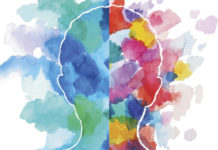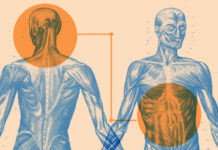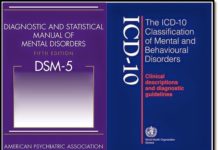Clinical Guidelines for Depression Need Urgent Revision
A coalition of 35 health organizations expressed serious concerns that the NICE guideline for adult depression may cause clinical harm—they demand “full and proper” revisions.
Julia’s TEDx Talk: Time to Get Serious About Nutrition
Based on any data from any country it is clear that we have a problem. Mental illness is on the rise. Researchers in the emerging field of nutritional psychiatry have documented the benefits of micronutrients to treat mental illness, showing that micronutrients help treat depression, stress, anxiety and autism and ADHD. Not a single study shows that the Western diet is good for our mental health. Many questions remain to be answered, but we can make some recommendations.
Researchers Identify 27 Categories of Emotion
A new study finds that emotions may be represented by 27 categories, with each category relating to others in a more complex and continuous fashion than previously understood.
New Evidence for Brain-Gut Link in Depression and Quality of Life
The first ever population-level study of the brain-gut connection in humans finds evidence for a link between gut bacteria and mental health.
Minimal Exercise Protects Against Depressive Symptoms in Older Adults
Study of older adults shows those who consistently exercised as little as 15 minutes, 3 times/week are less likely to develop depressive symptoms.
Philosophers Challenge Psychiatry and its Search for Mechanisms of Disorder
Attempting to locate the mechanisms of psychiatric disorder is a step in the wrong direction and fails to challenge potentially unjust social practices.
Developing Alternatives to the DSM for Psychotherapists
A new article suggests counselors and psychotherapists are dissatisfied with current diagnostic systems and outlines some potential alternatives.
Rethinking Madness and Medication: Researcher Discusses Psychiatric Drug Withdrawal and Survivor Movements
New understandings of medication and withdrawal experiences warrant rethinking conceptualizations of health and “madness."
New Study Investigates Negative Side Effects of Therapy
Researchers find that nearly half of cognitive behavioral therapy (CBT) patients experience treatment side effects.
New Study Investigates Cannabidiol (CBD) for Psychosis
A new study examines the effects of CBD as an adjunct therapy to antipsychotic medication for patients diagnosed with schizophrenia.
Addressing Depression and Heart Disease with Exercise and Physical Activity
A new study examines the effects of midlife exercise on depression and cardiovascular health later in life.
Community-Driven Healthcare for the Homeless Reduces Hospital Costs
Direct access to care in safe locations is key in reducing healthcare costs and increasing quality of life for homeless populations.
Patient Race Associated with Varied Psychiatric Treatment Experiences
Findings point to association between race and the mental health care experiences of African-American and White veterans.
How Does the Brain-Body Connection Affect Creativity?
From Big Think: Recent studies show that walking helps people think more creatively and originally. In three different studies, 81%, 88%, and 100% of participants...
Psychologists Advise How to Help and Minimize Harm Working With Migrants and Refugees
While well intentioned, providers and volunteers can do more harm than good at the border. The Global Psychosocial Network issues guidelines on how to work for the benefit of migrants and refugees.
Peer Providers of Mental Health Services Use Personal Narratives to Help
Interviews with peer providers indicate that they strategically use their personal illness and recovery story in order to assist others.
Existential Therapy Assists Patients Withdrawing From Psychiatric Drugs
Confronting existential anxiety through “Basal Exposure Therapy” shows promising results in people withdrawing from psychotropic drugs.
New Study Explores Approaches to Discontinuing Antidepressants
Psychiatrist and psychologist outline pharmacological and psychotherapeutic strategies for discontinuing antidepressants.
Study Explores Correlates of Low-Level Physical Activity and Psychosis
A study examines the variables correlated with low levels of physical activity in persons diagnosed with psychosis in low and middle-income countries
Evidence for Chile’s School-Based Mental Health Program
Chile’s Skills for Life (SFL) program, the largest school-based psychosocial intervention program in the world, has demonstrated improved behavioral and academic outcomes for elementary students identified as “at risk.” A team of Chilean and U.S. researchers assessed the SFL program and will publish their results in the October issue of the Journal of the American Academy of Child & Adolescent Psychiatry (JAACAP).
Mad Economy: Let’s Change the World!
Everyone in the world is either touched by their own mental health issues or have had a family member affected. What if they directed their buying power to an organization that would use the profits to fund exciting mental health & recovery projects both in the developing world and in their own countries; projects that would be ethical, non-coercive, personal recovery-based, and were aimed at creating recovery communities? What if they could buy products, crafts, services, art, music, books from people who had experienced mental health issues, enabling them to set up their own businesses or buy from social co-operatives that enabled distressed people to work and earn a living wage?
What is Contributory Injustice in Psychiatry?
An article on contributory injustice describes the clinical and ethical imperative that clinicians listen to service users experiences.
Review Examines Complementary Approaches for Pain Conditions
A review published in Mayo Clinic Proceedings used U.S.-based clinical trial evidence to examine the efficacy of complementary health approaches for chronic pain management....
Exercise Intervention for Youth at Risk for Psychosis Shows Promise
A new pilot study finds that an exercise intervention can lead to improvement in clinical, social, and cognitive domains for those deemed at risk for psychosis.
Troubling Mental Health Nurse Education
Mental health nurse education in not sufficiently critical of institutional psychiatric practice. Its formal curricula in universities are often undermined by the informal curricula of practice environments. As an institution, mental health nursing pays insufficient attention to both these issues because it is an arguably un-reflexive and rule-following discipline.






























